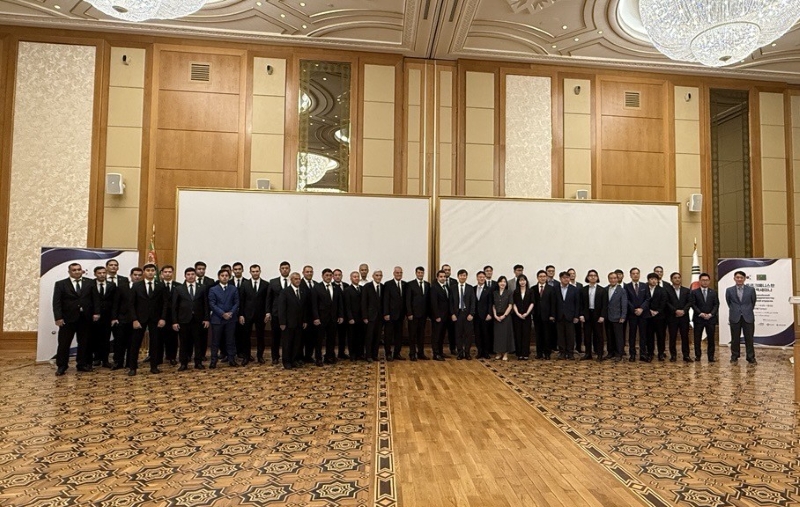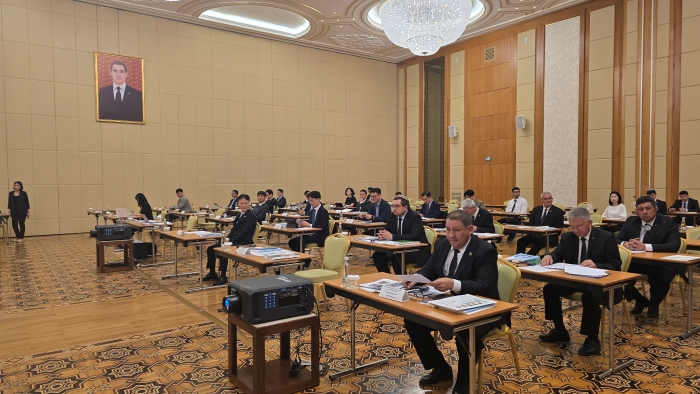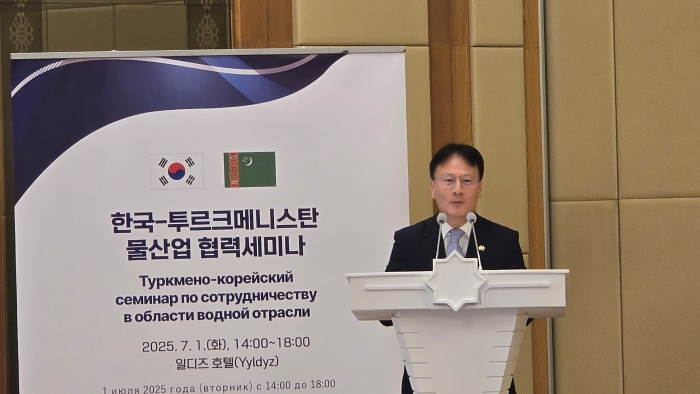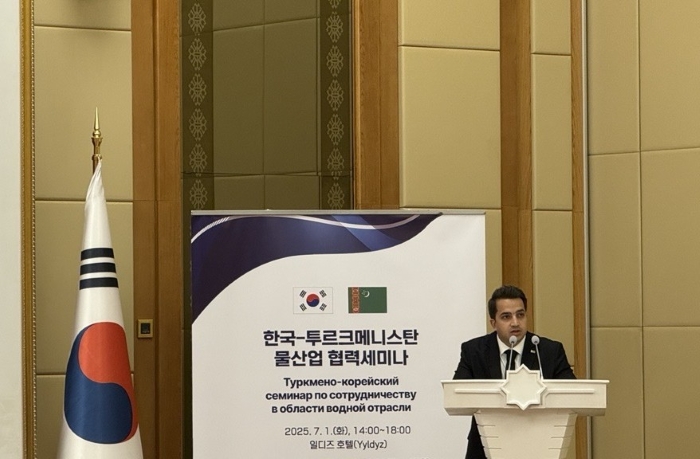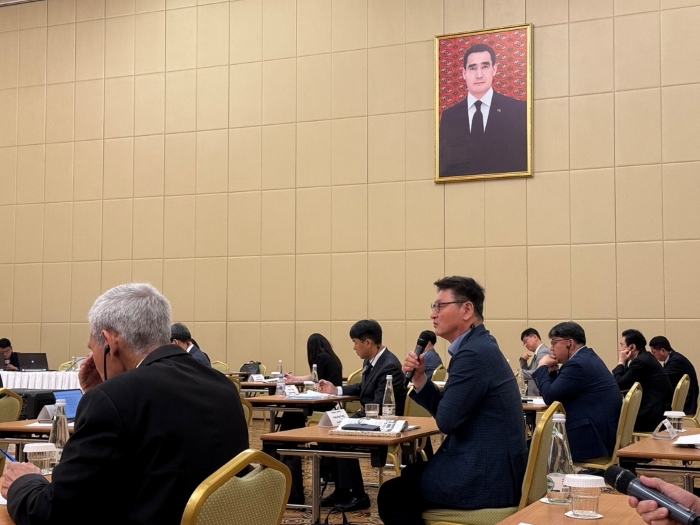Turkmenistan and the Republic of Korea continue to strengthen their partnership in the water sector through initiatives such as the “Smart Water Resources Management” training program, a bilateral visit by representatives of both countries on water management issues in 2023, and ongoing governmental collaboration.
To further advance this cooperation, a Korean delegation, comprising representatives from government ministries, agencies, and companies, is visiting Turkmenistan. The primary goal of the visit is to explore opportunities for collaboration in key areas of Turkmenistan’s water sector, including dredging operations, modernization of the Karakum Canal, and the implementation of systems for monitoring water quality and flow measurement.
On July 1, 2025, a Seminar on Water Management Cooperation between Turkmenistan and the Republic of Korea was held in Ashgabat as part of the visit.
The Korean side was represented by approximately 30 participants from the Ministry of Environment and the Ministry of Foreign Affairs of the Republic of Korea, as well as three key organizations:
– Korea Water Resources Corporation (K-Water), which focuses on dam construction and water supply for domestic needs;
– Korea Environment Corporation (K-eco), which supports the installation and operation of water treatment facilities, including water supply and sewage systems;
– Korea Water Partnership (KWP), a network fostering collaboration between water sector companies and government entities.
Additionally, 10 companies specializing in water technologies participated.
From the Turkmen side, representatives from the Ministry of Environmental Protection, the State Committee of Turkmenistan for Water Management, and the Turkmen State Institute of Water Management “Turkmensuwylymtaslama” took part.
The seminar was opened by Ji Kyu Taek, Ambassador Extraordinary and Plenipotentiary of the Republic of Korea to Turkmenistan. In his speech, he said: “Since 2019, a program of annual visits by Turkmen water management specialists to Korea has been successfully implemented to study advanced water treatment systems, multifunctional dams, and wastewater treatment facilities. The Republic of Korea offers cutting-edge technologies in water management, from AI-powered water treatment stations to seawater desalination and wastewater reuse. With the Amu Darya River, stretching over 2,000 km, and the Karakum Canal, approximately 1,400 km long, Turkmenistan has significant potential for developing its water infrastructure. I believe our countries have many opportunities for cooperation in the water sector, and I look forward to further successful collaboration.”
On behalf of Turkmenistan, Saparmyrat Charyev, Head of the Digital Technologies and Information Security Department of the State Committee of Turkmenistan for Water Management, delivered a welcoming address: “Our country, located in an arid climate, deeply understands the value of every drop of water. Our primary goal is to ensure stable water supply for the population, agriculture, and industry while maintaining ecological balance. In this regard, we are highly interested in the Republic of Korea’s expertise in water management.”
He highlighted the potential for cooperation in areas such as the adoption of innovative technologies, automated water resource management, and the use of renewable energy sources for water supply.
“We are ready to consider projects for the construction and modernization of water infrastructure and to combine scientific efforts in developing new water purification methods,” Charyev added.
Digital Twins and Water Clusters: South Korea’s Experience
Following the opening remarks, seminar participants were presented with an overview of the Republic of Korea’s water policy and current water management projects in Turkmenistan.
Representatives from key Korean water sector institutions delivered presentations:
– Oh Hye Rin, Assistant Director of the Ministry of Environment of the Republic of Korea;
– Lee Do Sang and Lee Je Jung, Senior Managers at Korea Water Resources Corporation (K-Water);
– Lim Joo Hwan, Manager at Korea Environment Corporation (K-eco);
– Shim Yoo Seop, Executive Director of Korea Water Partnership (KWP).
South Korea pursues a water management policy focused on sustainable, integrated, and efficient use of water resources, adaptation to climate change, and ensuring water security. The country’s approach has evolved from prioritizing water resource development to a comprehensive strategy that encompasses water quality, responses to climate crises (such as droughts), development of the water industry, active digitization, and the integration of artificial intelligence.
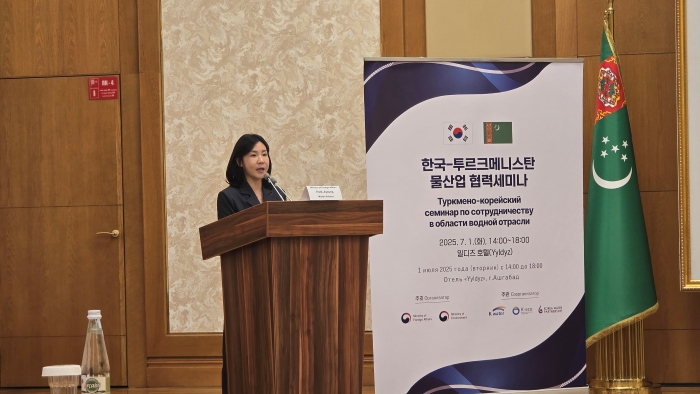
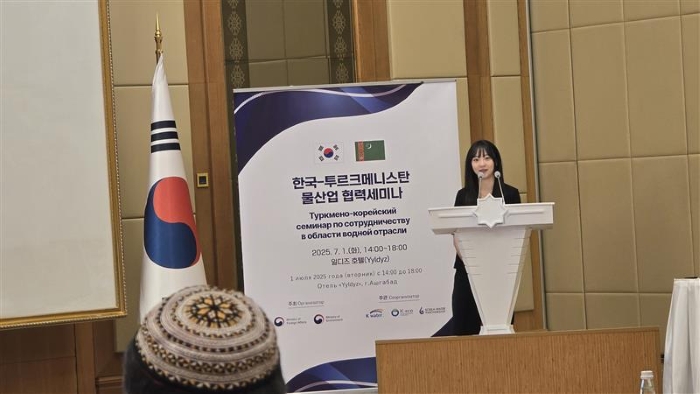
The Ministry of Environment of South Korea is actively advancing the digitization of water resource management to enhance efficiency, accuracy, and safety through cutting-edge technologies. This includes the implementation of smart water supply, sewage, and dam management systems, as well as the development of the Digital Twin Water platform for river management.
According to Korean experts, the adoption of smart technologies in water management can reduce water losses by 110 million cubic meters annually and cut CO₂ emissions by over 27,000 tons per year.
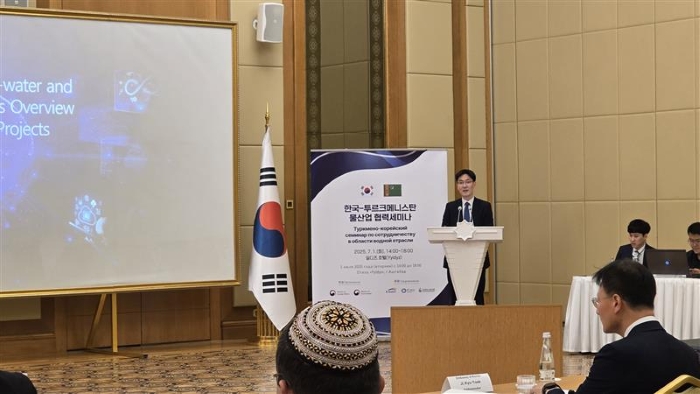
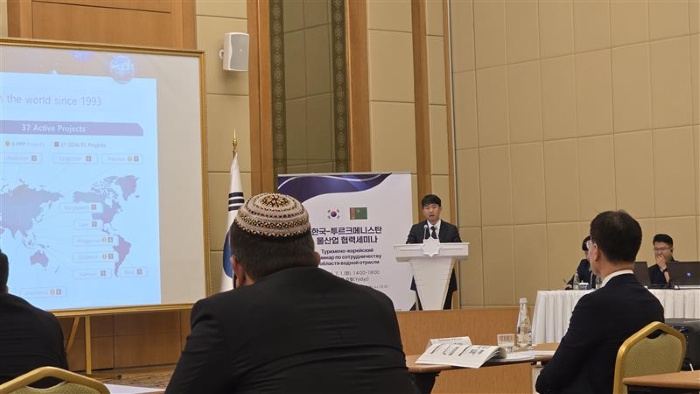
South Korea is actively implementing Digital Twin technology for advanced water resource management, particularly through efforts led by K-Water. The Digital Twin Water platform creates detailed 3D models of urban and non-urban areas, dams, reservoirs, and river landscapes. It provides real-time data on dam discharge restrictions, video feeds from surveillance cameras monitoring dams and rivers, locations of alert stations, sluice gate statuses, and meteorological information. This technology is considered critical for adapting to the growing uncertainties and complexities in water resource management caused by climate change, such as extreme precipitation, droughts, and floods.
Another significant initiative is the Korea Water Cluster (KWC), located in Daegu. This hub drives the development of South Korea’s water industry and its expansion into global markets. Operated by K-Eco, the KWC supports the entire innovation cycle, from research and development to industrial implementation.
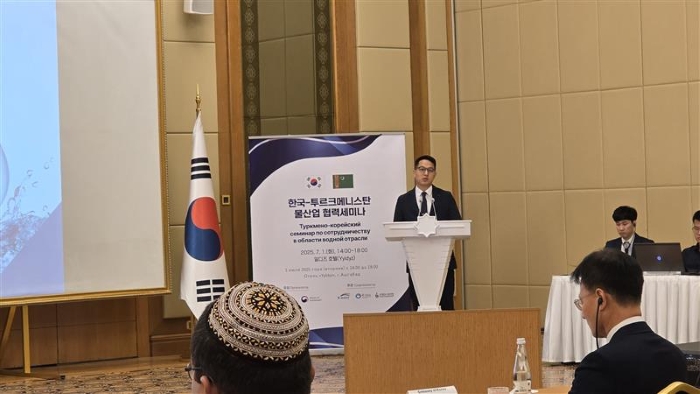
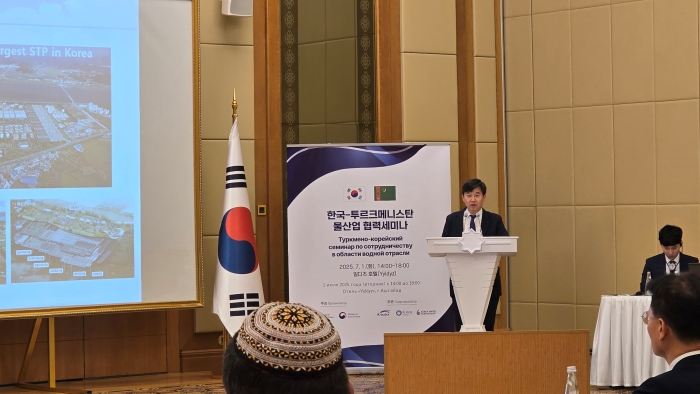
A key feature of the cluster is its ability to test and demonstrate new technologies in real-world conditions. It houses facilities for water purification, reuse, and quality control. The KWC also assists companies with R&D planning, certification, and validation of new products and solutions.
As highlighted in the presentations, South Korea’s water management policy is a dynamic, evolving process aimed at addressing emerging challenges and leveraging opportunities in water resource management. The country’s commitment to sustainable water management is evident in its innovative policies and practices.
Ecological and Water Future: Turkmenistan’s Initiatives
Representatives of Turkmenistan shared information with their colleagues about the country’s water sector development projects aimed at improving water supply, rational use of water resources, and enhancing irrigation efficiency. These projects include the construction of new reservoirs, the adoption of modern irrigation methods (such as drip irrigation, sprinkler systems, and rain-fed irrigation), and the analysis and modernization of existing irrigation and drainage systems to improve their efficiency.
The primary water artery for Turkmenistan is the transboundary Amu Darya River, with 80% of its flow originating in the mountainous regions of Tajikistan and 20% in Afghanistan.
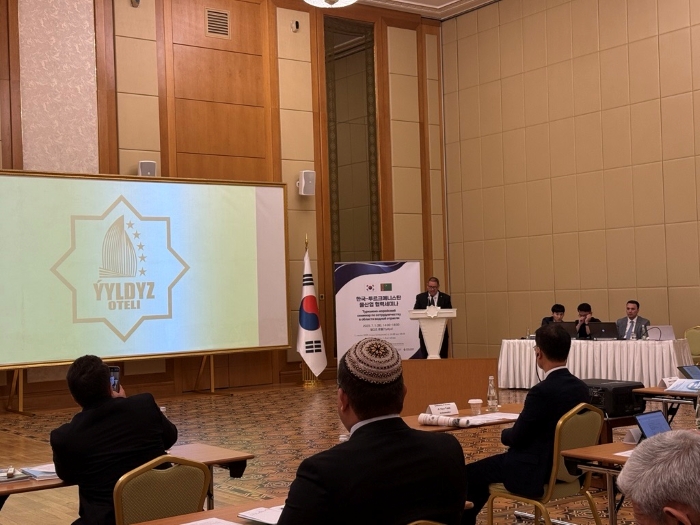
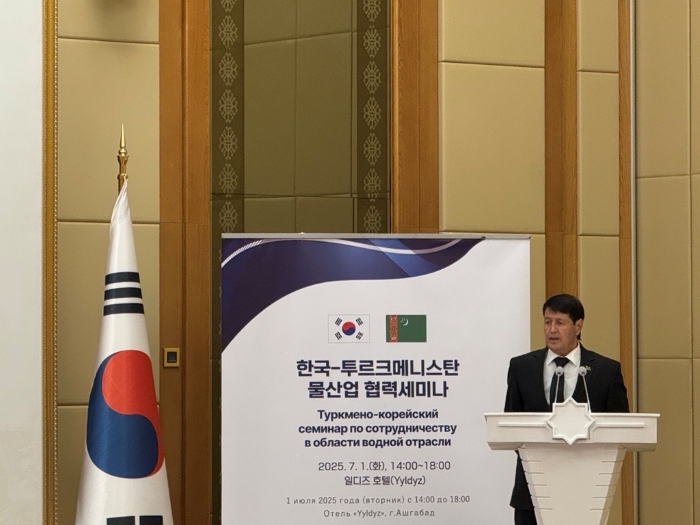
Recognizing the critical role of large reservoirs, Turkmenistan is undertaking systematic efforts to increase the capacity of existing reservoirs and construct new ones along waterways such as the Karakum River, Murghab, Tejen, and others.
Currently, the country has 14 reservoirs, each with a capacity exceeding 10 million cubic meters, totaling 4.37 billion cubic meters. Expansion works are underway on three reservoirs to add an additional 3.67 billion cubic meters, which will increase the total capacity to 8.04 billion cubic meters upon completion.
The largest hydraulic engineering project, attracting significant interest from international experts, is the Turkmen Lake “Altyn Asyr.” This unique project plays a pivotal role in improving the ecological situation in Central Asia. With the commissioning of its first phase, the discharge of collector-drainage water into the Amu Darya River has ceased. All of Turkmenistan’s collectors have been integrated into a unified system that directs runoff to the lake, located in the Karashor Depression in the Karakum Desert.
The Turkmen Lake “Altyn Asyr” contributes to biodiversity, supporting over 20 fish species in its waters and an increasing bird population in the surrounding area. The network of main collectors and their tributaries, spanning a total of 2,654 km, facilitates water evaporation from the lake’s surface, creating a humid atmospheric zone. This reduces the frequency of dust storms and positively impacts local flora and fauna, contributing to an improved ecological environment in the region.
Contours of the Future Water Partnership Between Korea and Turkmenistan
Presentations by Korean and Turkmen specialists highlighted promising directions for bilateral cooperation in the water sector. On one hand, Turkmenistan is focused on adopting modern technologies in its water industry. On the other hand, South Korea emerges as a valuable partner, capable of sharing advanced practices and innovative solutions.
This was a key focus during the question-and-answer session. The lively discussion enabled specialists to identify areas for further development through detailed follow-up discussions, including beyond the scope of seminars. Valuable proposals emerged, such as organizing visits for Turkmen water management experts to Korea to gain firsthand experience with the technologies presented at the seminar, opportunities for Turkmen students to intern in Korea, and the establishment of a specialized water management training center in Turkmenistan with Korean support.
***
The second part of the seminar was dedicated to presentations by Korean companies specializing in various aspects of water management. Each company showcased innovative technologies and solutions applicable to Turkmenistan’s water sector. The participants included:
– Saman Corporation — an engineering company designing water supply and sewage systems.
– Grenex Limited — developer of the globally applied GDisk filtration technology.
– Samjin Precision Co., Ltd — specializes in manufacturing industrial pipeline fittings and mechanical systems for water and wastewater treatment.
– Bluewin Co., Ltd — a leading provider of advanced wastewater sludge treatment technologies in Korea.
– Daehan Environment — focuses on producing water purification equipment.
– Newtork Korea Co., Ltd — a recognized supplier of solutions for electric drives.
– Turbowin Co., Ltd — specializes in turbocharging systems for wastewater treatment facilities.
– KOMOTO Inc. — a manufacturer of smart valve systems.
– Daewoo Engineering & Construction Co., Ltd — a leader in the construction industry in Korea and globally, implementing projects for thermal, nuclear, and tidal power plants, LNG terminals, residential and commercial buildings, roads, and bridges.
– Hyundai Corporation — delivers complex turnkey projects, including power plants, oil refineries, environmental facilities, and transport infrastructure.
***
The Seminar on Water Industry Cooperation between Turkmenistan and the Republic of Korea served as a vital platform for exchanging knowledge, expertise, and technologies in the field of sustainable water resource management. The presented initiatives, national projects, and innovative solutions demonstrate significant potential for further deepening the partnership between the two countries.
South Korea’s innovative technologies, such as the Digital Twin, smart water supply systems, and the Korea Water Cluster, open new opportunities for modernizing Turkmenistan’s water infrastructure. In turn, Turkmenistan’s ambitious projects, including the development of reservoirs and the Turkmen Lake “Altyn Asyr,” underscore the country’s commitment to the rational use of water resources and improving the ecological situation in the region.
Amid growing water scarcity, climate change, and the need to enhance water use efficiency, the collaboration of governments, scientific institutions, and businesses becomes a key factor in achieving shared goals—rational water resource management, environmental improvement, and ensuring water security.
The open dialogue, technological exchange, and mutual interest demonstrated during the seminar create a solid foundation for developing and implementing joint projects that address both national priorities and global water resource challenges. ///nCa, 2 July 2025
